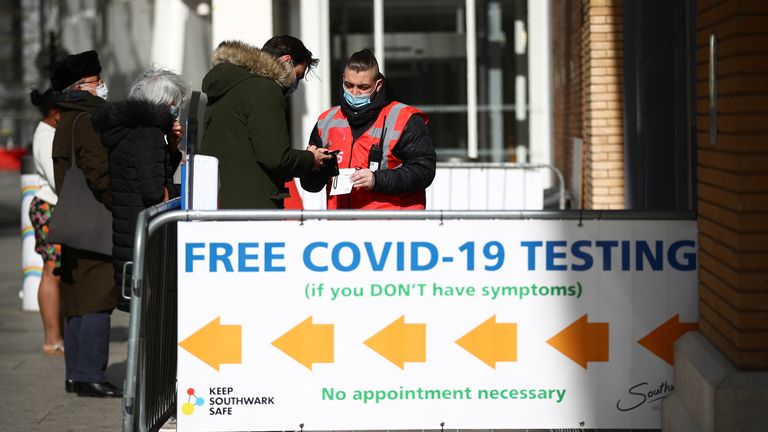COVID-19: Vaccines prevent 84,600 deaths in England - as cases up in almost all regions and age groups
An expert warns that the rate of decline in new daily COVID cases across the UK could be slowing down, as data reveals increases in most regions and those in their 20s and above.
Friday 13 August 2021 05:26, UK
Coronavirus case rates have risen in most regions of England and among almost all age groups, latest figures from Public Health England (PHE) show.
Case rates rose in all regions of England except the North East, and among all age groups except 10 to 19-year-olds, according to the latest PHE weekly surveillance report.
It comes as separate PHE data showed the COVID-19 vaccine rollout in England is estimated to have prevented more than 84,000 deaths.
PHE said on Thursday that 84,600 deaths and nearly 23.4 million coronavirus infections have been prevented as a result of the vaccination programme up to 6 August.
Estimates of how many hospital admissions in England have been directly averted by the vaccine remain unchanged at 66,900.
Dr Yvonne Doyle, PHE's medical director, said: "Data suggests that COVID-19 cases are currently stable, although rates remain high across the country."
She added that vaccines "are breaking the link between infections and serious illness".
More than 40 million people, or 75.7% of the UK's adult population, is now fully vaccinated.
However, the PHE surveillance report suggests cases are on the up once again.
The highest case rate is among 20 to 29-year-olds, with 670.7 cases per 100,000 people in the seven days to 8 August, up week-on-week from 628.6.
The second highest rate is among 10 to 19-year-olds, down from 515.4 to 456.1, and the lowest rate is among people aged 80 and over - 66.6, up slightly from 65.
Yorkshire and the Humber is the region with the highest rate, with 372.4 cases per 100,000 people in the same seven-day period, up week-on-week from 359.7.
The East Midlands has the second highest rate: 338.5, up from 312.7; the South East has the lowest rate: 255, up from 234; and in the North East the rate fell from 325.5 to 286.4.
It comes as an expert warned that the rate of decline in new daily symptomatic cases across the UK could be slowing down.
A total of 179,748 people tested positive for coronavirus in England at least once in the week to 4 August, according to the latest Test and Trace figures.
This is down 5% on the previous week and the second consecutive week-on-week fall.
Figures published last week saw the numbers fall for the first time in almost three months.
And according to separate data from the Zoe COVID Study, there are currently 45,911 new daily symptomatic cases of the virus in the UK on average, based on PCR and lateral flow test data from up to five days ago.
This is a fall from the 46,905 figure reported last week but researchers said the fact that the decrease is small suggests the rate of decline has slowed.
Professor Tim Spector, lead scientist on the study and professor of genetic epidemiology at King's College London, said: "The decrease in cases that we saw last week appears to have faltered over the last few days, and we're seeing signs of an uptick.
"However, it's too early to say if this is a start of another steep increase like the one we saw in July.
"While it's reassuring to see loosened restrictions haven't caused cases to skyrocket, it's more difficult to predict the future. Cases remain relatively low in the fully vaccinated group, which is a sign that vaccines are working and keeping the spread at bay."
He said their research has recently observed a "slight increase" in cases in the over-60s who were vaccinated a while ago, adding: "This could be due to waning immunity and we're keeping a close eye on the performance of vaccines over time."
Follow the Daily podcast on Apple Podcasts, Google Podcasts, Spotify, Spreaker
The government is awaiting advice from the Joint Committee on Vaccination and Immunisation (JCVI) on a booster jabs rollout, which could start as early as next month.
Experts said they are still assessing data before they confirm whether all over-50s and the clinically vulnerable will need a third jab.
The Zoe data is based on reports from around one million weekly contributors and the proportion of newly symptomatic users who have received positive swab tests.
Researchers said the latest figures were based on data from 25,767 recent swab tests carried out between 24 July and 7 August.



